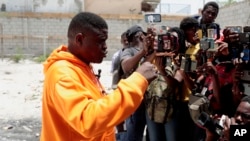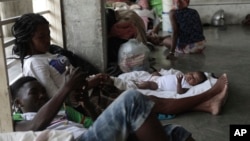Jimmy Cherizier, leader of the powerful G9 Family and Allies gang (FRG9) in Port-au-Prince, told reporters Wednesday he would welcome a multinational police force to help Haiti restore security — under certain circumstances.
"If, when, the foreign forces arrive, they arrest the corrupt oligarchs, politicians and politicians who are selling weapons and ammunition to the people in the underprivileged neighborhoods, I will applaud them," Cherizier said.
"If the first thing they do when they arrive in the country is arrest [Haitian Prime Minister] Ariel Henry, we'll applaud the foreign force. If we see them working to reestablish security in the country so life can get back to normal, we'll applaud them," he added.
Cherizier, a former Haitian national police officer who also is known by the alias "Barbecue," is one of the gang leaders the multinational force aims to target. His statement to reporters made no mention of that.
But he did issue a warning:
"If the foreign forces arrive in 2023 or 2024, and we see them sexually assaulting women, raping young boys just as the Uruguayan soldiers did in 2004. If they bring cholera back to Haiti. … If that is what they are coming to do in the underprivileged neighborhoods, along with opening fire on us, killing the people or massacring them — we Haitians will fight them until we shed our last drops of blood," he said.
Cherizier is one of the Haitian gang leaders sanctioned by the United States, Canada and the United Nations for human rights abuses, kidnappings and stoking violence that has resulted in thousands of deaths in the capital.
In October 2022, Henry appealed to the international community for an international force to help Haiti's national police combat gang violence and make the country secure.
U.N. Secretary-General Antonio Guterres made a similar appeal earlier this year and again on Aug. 15 in a report on the situation in Haiti sent to the presidency of the Security Council. The United States currently holds that position.
Cherizier, who spoke from an open construction site with cement blocks and piles of sand visible in the background, said the fight against the U.N. force will not just involve FRG9 but also the Haitian people.
"We must protect our dignity. We must defend our sovereignty so we can live as human beings," he said.
Cherizier also announced a reconciliation with the Je Pèp Gang (Eye of the People) that FRG9 had been fighting in the past weeks for control of the Bel Air neighborhood in the capital, Port-au-Prince.
"It took a long time, but we have good news [to announce]. We say yes to life, no to death. We will no longer fight against each other."
The FRG9 gang was behind a weekslong blockade of the main Varreux oil terminal in Port-au-Prince, which triggered a nationwide fuel shortage until the national police were able to break the blockade. It was during the blockade that Henry appealed to the U.N. for an armed intervention.
Kenya offered in July to lead a multinational police force in Haiti. Jamaica and the Bahamas have expressed willingness to contribute police. The United States said it will take a "comprehensive approach" to supporting the force that will include financial and technological assistance.
A recent poll by the Agency for Managing Risk and Security in Haiti found that 68% of Haitians believe a multinational force is needed to help restore security.
Kenya said it will send a group to examine the security situation on the ground and determine needs. The U.N. Security Council plans to vote on a resolution authorizing the multinational force for Haiti in the coming weeks.





